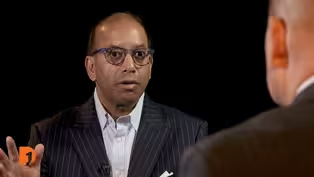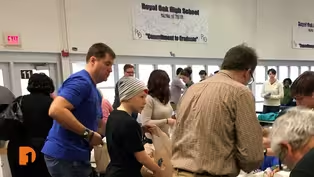
Black churches provide sanctuary, support for mental health
Clip: Season 9 Episode 29 | 6m 54sVideo has Closed Captions
Black churches provide sanctuary and support for youth facing mental health challenges.
Mental health challenges have become more prevalent among African American teens and young adults. One Detroit contributor Stephen Henderson talks with Triumph Church Minister Mikiah Keener and Ashley Lewis, a student at the Ecumenical Theological Seminary, about how local Black churches can provide safe spaces for youth and promote mental wellness.
Problems playing video? | Closed Captioning Feedback
Problems playing video? | Closed Captioning Feedback
One Detroit is a local public television program presented by Detroit PBS

Black churches provide sanctuary, support for mental health
Clip: Season 9 Episode 29 | 6m 54sVideo has Closed Captions
Mental health challenges have become more prevalent among African American teens and young adults. One Detroit contributor Stephen Henderson talks with Triumph Church Minister Mikiah Keener and Ashley Lewis, a student at the Ecumenical Theological Seminary, about how local Black churches can provide safe spaces for youth and promote mental wellness.
Problems playing video? | Closed Captioning Feedback
How to Watch One Detroit
One Detroit is available to stream on pbs.org and the free PBS App, available on iPhone, Apple TV, Android TV, Android smartphones, Amazon Fire TV, Amazon Fire Tablet, Roku, Samsung Smart TV, and Vizio.
Providing Support for PBS.org
Learn Moreabout PBS online sponsorship(light music) - I'm the father of two children who just got out of teenage years and now are gonna be in their early 20s.
So I remember all of these questions and all of these challenges that kids these days face.
And the thing that I have struggled the most with is how different they are from the things that I can remember struggling with when I was a teenager, I don't know, some 40 years ago.
I don't wanna talk about how long ago that was, but it's just different now.
And there are all kinds of things that we don't have, we didn't have to think about then that we do have to think about now.
So I guess that's where I want to start.
Ashley, we'll start with you.
Tell us about what you hear from young people here now, what you see with them, and how different it all is.
- So I'd like to start off by saying that teen suicide has been identified as a national crisis, and so much of it, even the Biden-Harris administration is really doing a lot to really counter this.
For me personally, it hits home, because my son, who's 13 years old, and he's a young Black male who goes to a predominantly European school.
I don't subscribe to Black white, but European school.
And what I've noticed is the impact of AI.
So if you look at the history of the Black church, when you talk about anti-Black or racism manifesting, there were signs, there was this overt manifestation of it.
While some of it is still overt, a lot of it is covert.
So my own son, I didn't even know he was dealing with depression, thank God they had those forms with the doctors when they do their annual physicals, because I had no idea, but part of it was because of bullying.
And he talked about how in social media, those algorithms, he was noticing within his friend group.
And so then there was all of these different racial, and not just towards African Americans, but towards other racial ethnic groups as well.
And so as a result, the bullying began to increase not only through the perception of anti-Blackness within social media, but also in terms of manifesting within his friend group.
And so what I think is, or what I'm seeing is I'm bringing more present to is the fact that the Black church is still the pinnacle point of making sure that our children actually understand what is Christ-rooted, which is grace, mercy, humanity, but also what's African-centered, you know, knowing that you actually are community-oriented, that you come from a long lineage that transcends just the European Slave Trade that began our history, which actually doesn't begin there.
I could go on and on, but the reality of it is a lot of the history told in America only starts with the narrative of slavery.
So getting back to our actual roots, and the great dynasties of which we come from to actually build and cultivate the identities of our children is more necessary now.
- Mikiah, tell us what you see at Triumph and what kind of things you hear and notice with young people.
- Absolutely.
I think that's a phenomenal question.
So one of the things I see, and to be honest, not only at Triumph, but just within my community, being a 26-year-old that does a lot of activity in the Metro Detroit area, a lot of our young people are eager for God, they're eager for Christ, they're eager to be a part of a church, they're eager to be a part of that community, they just don't know where to start.
And I think that is the role of the church, especially in this season, is to hold their hand and give them a GPS, I think that's what the church should be.
It's a GPS to kind of just help young people navigate and walk through life.
A lot of them have questions about mental health, a lot of people raise up questions about depression.
Is God mad at me because I'm depressed, because my mental health is declining?
And so I think that the church should serve in a role of holding their hand and walking with so many young people and just guiding them to what that looks like to integrate faith and mental health.
- Yeah, so Mikiah, I wanna talk a little about the hesitancy in our community to acknowledge that mental health is a real concern and a concern not just worthy of voicing, but worthy of seeking help for.
There's a lot of stigma that attaches to it, and that gets magnified, I think sometimes in our community.
How do churches help young people kind of confront that part of it by just saying, "Look, it's okay, however you feel, you need to talk about it."
- Absolutely.
I think to just understanding that God has left us with the Bible, the Word is God.
And so starting with the most important thing, the Word, and being able to draw and pull from the Word scriptures and principles and lessons to make applicable to today's situations and different battles.
Because even though it is a document or a text, or a book that is old, it's timeless, right?
And so there's scriptures that we can pull from.
I mean, even the Proverbs talk about seeking wise counsel.
So I think when we start at the Word, that, again, it's a navigation system, it's a guide to help people address those principles and those questions.
Because a lot of the answers that people are looking for is found in a book that people won't open up and read.
And I think that if we start with the Word of God, it helps us to have a more clear understanding of some of the things and the battles that we deal with, especially on a mental level.
- Just hearing what Black church is doing.
And I wanna encourage anybody watching this, you could drop your children off with us.
We are going to literally help- - Take care of them, right?
- I even thought about the Girl Scouts.
We have all these mentorship programs, we got piano players, we got all these Money Matters programs.
But what I wanna say is that what we don't recognize with mental health is that it's not just an issue that can be solved solely by the church, which that's why I'm grateful to be under the leadership of Pastor Anthony, Pastor Reverend Dr. Wendell Anthony because he constantly reminds us that our call is not just to say, you know, be a holy hope dealer or to say God bless you, but to also do the political action that is required to cultivate the society so that our youth can thrive.
2025 Detroit Policy Conference explores innovation economy
Video has Closed Captions
Clip: S9 Ep29 | 7m 4s | The Detroit Regional Chamber shares a preview of its 2025 Detroit Policy Conference. (7m 4s)
Things to do around Detroit this weekend: January 17, 2025
Video has Closed Captions
Clip: S9 Ep29 | 1m 41s | Peter Whorf of 90.9 WRCJ shares some events coming up around the region this weekend. (1m 41s)
Three Metro Detroit schools celebrate MLK Day by giving back
Video has Closed Captions
Clip: S9 Ep29 | 6m 5s | The Royal Oak, Berkley and Clawson school districts celebrate MLK Day by giving back. (6m 5s)
Providing Support for PBS.org
Learn Moreabout PBS online sponsorship
- News and Public Affairs

Top journalists deliver compelling original analysis of the hour's headlines.

- News and Public Affairs

FRONTLINE is investigative journalism that questions, explains and changes our world.












Support for PBS provided by:
One Detroit is a local public television program presented by Detroit PBS


